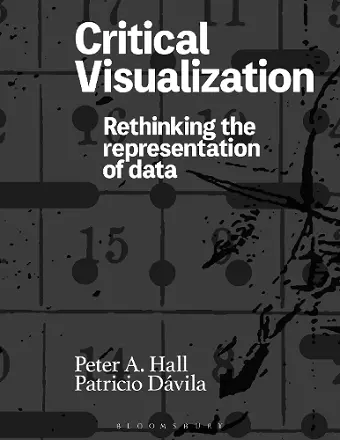Critical Visualization
Rethinking the Representation of Data
Peter A Hall author Patricio Dávila author
Format:Paperback
Publisher:Bloomsbury Publishing PLC
Published:29th Dec '22
Should be back in stock very soon

This book provides a critical examination of data visualization's history and its influence on societal issues, particularly in relation to war and colonialism.
In Critical Visualization, the author explores the intricate relationship between data representation and the socio-political contexts that shape our understanding of information. The narrative delves into the history of data visualization, revealing how it has been intertwined with significant modern phenomena such as war, colonialism, and the management of social issues like poverty, health, and crime. By examining various examples of visualization techniques, from ancient Andean quipus to contemporary urban projects, the book illustrates the evolution of information design over time.
The text emphasizes that the decisions we make about data representation are never neutral, highlighting the biases and implications that accompany different visualization choices. Through a critical lens, Critical Visualization provides a framework for understanding how visualization can influence public perception and policy. The author encourages readers to consider the ethical dimensions of data representation and its impact on society.
By situating visualization within its theoretical and cultural contexts, this book offers valuable insights into the history of information design. It not only critiques past practices but also proposes new directions for contemporary visualization efforts. As we navigate an increasingly data-driven world, Critical Visualization serves as a vital resource for anyone interested in the power of visual information and its role in shaping our understanding of complex issues.
Debunking the idea that data is ever ‘raw’ or unbiased, this book brings information anxiety to a new level as it goes deep into the underlying power structures at play in the assemblage of data and the motivations of those who amass it. Hall and Dávila explain how design’s focus on clarity and statistical accuracy can serve to enhance dominant narratives inherent in the data and challenge designers to activate their agency to visualize the kind of world in which we want to live. This should be required reading in any data visualization or information design curriculum. -- Thomas Starr, Professor of Graphic and Information Design, Northeastern University, USA
Hall and Dávila make a compelling argument for a critical approach to data visualization. Through a comprehensive survey of extant literature, a rereading of canonical images through decolonizing frameworks, and discussion of highly topical debates, they arrive at a rich examination of current projects drawn from a wide array of activities. They address self-quantification, smart cities, emotional cartography, and a whole host of specific and activist interventions in conventional data practices. Ultimately, they argue for visualizations that might create alternatives to dominant conventions and the oppressive power asymmetries of the status quo. -- Johanna Drucker, Distinguished Professor of Information Studies, UCLA, USA
With acuity and depth, Hall and Dávila demonstrate just how much history, culture and context matter for the design and interpretation of data visualization. Their book is timely and important, and will usher in a new era of critical data practice. -- Lauren Klein, Winship Distinguished Research Professor, Departments of English and Quantitative Theory and Methods, Emory University, USA
ISBN: 9781350077249
Dimensions: 248mm x 186mm x 14mm
Weight: 700g
256 pages